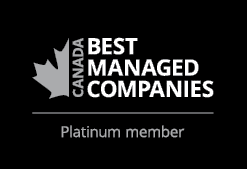Canada ranks among the top 10 countries globally for the soundness of our financial system,1 and Canadians have traditionally enjoyed a stable financial services marketplace that includes banks, insurance companies, and mutual fund dealers. However, the concentrated nature of our financial services marketplace can lend itself to higher fees, leading to “below average” ratings when it comes to the fee experience for investors and ranking Canada as one of the lowest in the developed world in this category.2
With the advent of financial technology companies, a growing number of Canadians are choosing to take advantage of robo-advisors in the financial services industry.
To date, much of the available data on the impact of financial technology companies or robo-advisors has focused on the benefit to retail investors. However, robo-advisors have also become available to Canadians saving and investing through employer-sponsored group retirement savings plans.
What is a robo-advisor?
The term “robo-advisor” describes firms that provide online investment management services. “Robo” refers to the automated, online nature of enrolling clients into investment portfolios. Robo-advisors leverage technology and low-cost exchange-traded funds (ETF), to remove unnecessary layers and fees between the everyday investor and their investments.
Tailored solutions and strategic approaches for workplace retirement savings plans.
What is an ETF? How does it compare to traditional investments?
While most Canadians are familiar with mutual funds or the funds available in their employer-sponsored plans, many have never heard of ETFs, which were not introduced in Canada until the early 1990s. Robo-advisors can build customized investment portfolios using ETFs and their low-cost nature can help manage costs for clients. However, cost is not the only factor in return on investments, and returns—net of fees—should always be compared.
Mutual funds and ETFs share a few basic similarities. Both are investment vehicles that allow investors to pool their money to purchase a basket of securities, including stocks, bonds, and other assets. These products can create opportunities to invest money in several securities at once, producing a diversified portfolio without requiring an individual to invest a large sum of money.
Despite these similarities, ETFs and mutual funds also have significant differences:
- Buying and selling: Mutual funds can only be purchased from licensed representatives through private dealers; in contrast, ETFs are easily bought and sold on a public stock exchange
- Performance: Most mutual funds are actively managed, meaning that the fund manager seeks to generate an investment return that is better than the return of the fund’s benchmark; typically, a benchmark is a representative stock index, such as the S&P 500, however, mutual fund managers are not always able to consistently beat their benchmark returns;3 ETFs are passively managed, as they attempt to replicate the performance of the benchmark, rather than trying to beat it
- Cost: Providers of ETFs charge low management expense ratios (MERs)
ETF investing has gained significant momentum in recent years. For example, in 2020, Canadians added over $40 billion into ETFs, investing approximately $30 billion into mutual funds.4
Bringing it all together: robo-advisors, ETFs and your group savings plan
For those interested in taking advantage of low fees, opening an account with a robo-advisor will allow the average Canadian to easily invest in a low-cost, professionally-managed portfolio of ETFs. The typical robo-advisor uses a straightforward three-step process, which takes about 15 minutes to complete. Just as robo-advisors allow individual advisors to open accounts, employers can also opt to offer group savings plans to employees through robo-advisor services.
- Step One – Online Investment Questionnaire: The investor answers approximately 10 questions related to investment objectives and risk tolerance; using this information, the robo-advisor’s algorithm recommends a diversified portfolio of ETFs designed to meet the investor’s specific needs
- Step Two – Invest: After collecting personal details to set up the investment account, the robo-advisor can invest the funds into the selected portfolio of ETFs, with the help of a Personal Portfolio Manager assigned to the investor
- Step Three – Monitoring and Rebalancing: The portfolio is monitored daily by the robo-advisor and automatically rebalanced to ensure the investments are always aligned with the investor’s objectives and risk tolerance
Cowan Insurance Group and Justwealth Financial
When some people hear the term “robo-advisor,” they assume that they will be interacting solely with an app or a machine, without access to advice from a portfolio manager. However, it’s important to note that the human element of investing is still present, and clients still receive service and advice from a Portfolio Manager. Cowan has recently partnered with Justwealth to offer our clients a broad range of options to meet their investment needs. Justwealth’s Personal Portfolio Managers and account staff regularly interact with clients, available to guide them every step of the way.
While robo-advisors have some advantages, they may not be the solution for everyone and, as an employer, it is important to review all aspects of a retirement plan offering for your employees (e.g., fees, returns, plan member experience, governance reporting etc.). A Cowan consultant can assist with this review.
Sources
- World Economic Forum, Global Competitiveness Rankings, 2017-2018. ↵
- Morningstar Global Investor Experience Study: The Fees and Expenses Report, 2019. ↵
- SP Global: SPIVA Statistics & Reports, June 30, 2020. ↵
- CETFA and IFIC. ↵

-min.jpg?width=400&name=MFA_Blog%20(1)-min.jpg)
-min.jpg?width=400&name=AJ%20Feltis%20(1)-min.jpg)
-min.jpg?width=400&name=Healthy_Workplace_Blog%20(1)-min.jpg)

